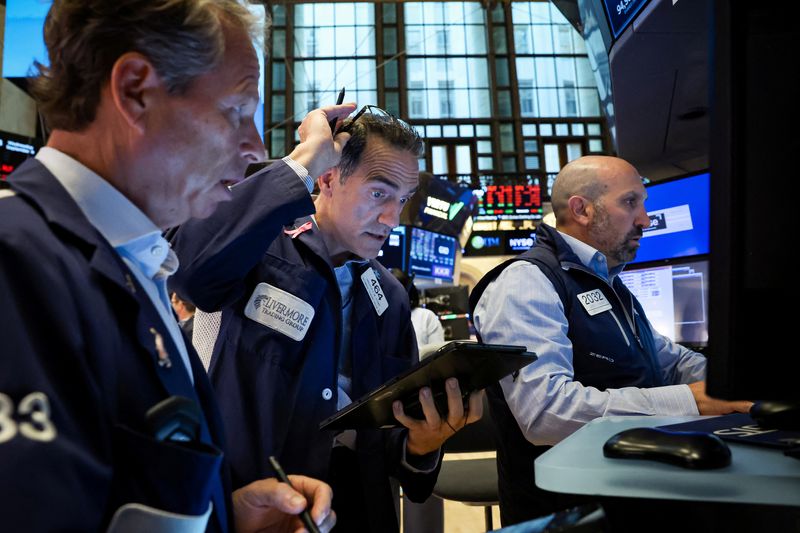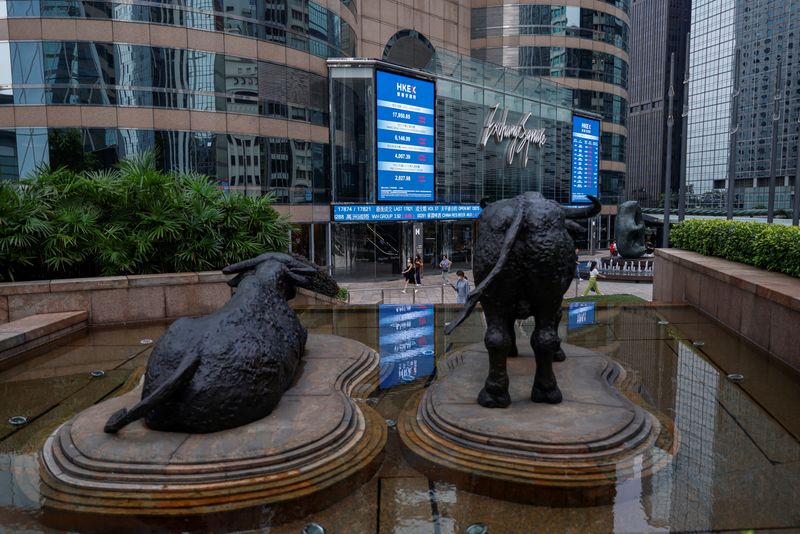By Sinéad Carew and Amanda Cooper
NEW YORK/LONDON (Reuters) -MSCI's global equities index rose on Friday while the dollar climbed to its highest level since mid-August as investors heaved a sigh of relief after a surprisingly strong U.S. labor market report.
Oil prices rose and settled with their biggest weekly gains in over a year on the mounting threat of a region-wide war in the Middle East, but gains were limited as U.S. President Joe Biden discouraged Israel from targeting Iranian oil facilities.
Earlier on Friday, the U.S. Bureau of Labor Statistics said 254,000 workers were added to nonfarm payrolls last month, above the 140,000 economists had estimated. The 4.1% unemployment rate was below estimates while August job growth was revised higher.
U.S. Treasury yields rose to their highest level since early August as traders ditched bets that the Federal Reserve will cut rates by half a percentage point next month after the stronger-than-expected jobs report.
Traders now see a roughly 97% probability the Fed will cut rates by only a quarter percentage point in November, up from roughly 68% on Thursday, CME Group's (NASDAQ:CME) FedWatch tool showed.
"U.S. equities reaction to this very strong jobs growth confirms that investors are most concerned about economic growth" even when it comes with a "hawkish disruption," said Julia Hermann, global market strategist, New York Life Investments.
"The fact the market has been able to digest this hawkish shift points to a constructive view about the economic outlook," Hermann added, pointing to moves in U.S. Treasuries as well as stocks.
Likely bringing further relief for U.S. economy was the reopening on Friday of U.S. East Coast and Gulf Coast ports after dockworkers and port operators reached a wage deal to settle the industry's biggest work stoppage in nearly half a century. However, clearing cargo backlog is expected to take time.
On Wall Street the Dow Jones Industrial Average rose 341.16 points, or 0.81%, to 42,352.75, registering a record closing high. The S&P 500 climbed 51.13 points, or 0.90%, to 5,751.07 and the Nasdaq Composite advanced 219.37 points, or 1.22%, to 18,137.85.
MSCI's gauge of stocks across the globe rose 4.82 points, or 0.57%, to 847.12. For the week, the index showed a roughly 0.7% decline. Earlier, Europe's STOXX 600 index rose 0.44%.
Investors remained anxious about how Israel would respond after Iran fired missiles at it on Tuesday. Supreme Leader Ayatollah Ali Khamenei said earlier that Iran and its regional allies will not back down.
But oil prices pared gains after U.S. President Biden said that, in Israel's shoes, he would consider alternatives to striking Iranian oil fields and that he thinks Israel has not decided yet how to respond.
U.S. crude settled up 0.9% at $74.38 a barrel and Brent settled at $78.05 per barrel, up 0.55% on the day.
In currencies, the dollar jumped to a seven-week high and was eying its biggest weekly gain since September 2022 after the jobs report led traders to cut their bets on a big Fed rate cut.
Based on its gains for the full week, New York Life's Hermann said the dollar was also "clearly reacting to geopolitical risk."
The dollar index, which measures the greenback against a basket of currencies including the yen and the euro, rose 0.56% to 102.48.
The euro was down 0.5% at $1.0976 while against the Japanese yen, the dollar strengthened 1.25% to 148.77.
In Treasuries, the yield on benchmark U.S. 10-year notes rose 12.5 basis points to 3.975%, from 3.85% late on Thursday while the 30-year bond yield rose 7.9 basis points to 4.259%.
The 2-year note yield, which typically moves in step with interest rate expectations, rose 21.8 basis points to 3.9321%, from 3.714% late on Thursday.

In precious metals, gold prices slipped after the stronger-than-expected U.S. jobs report poured cold water on expectations for another big Fed rate cut.
Spot gold fell 0.23% to $2,649.89 an ounce. U.S. gold futures fell 0.38% to $2,647.10 an ounce.
